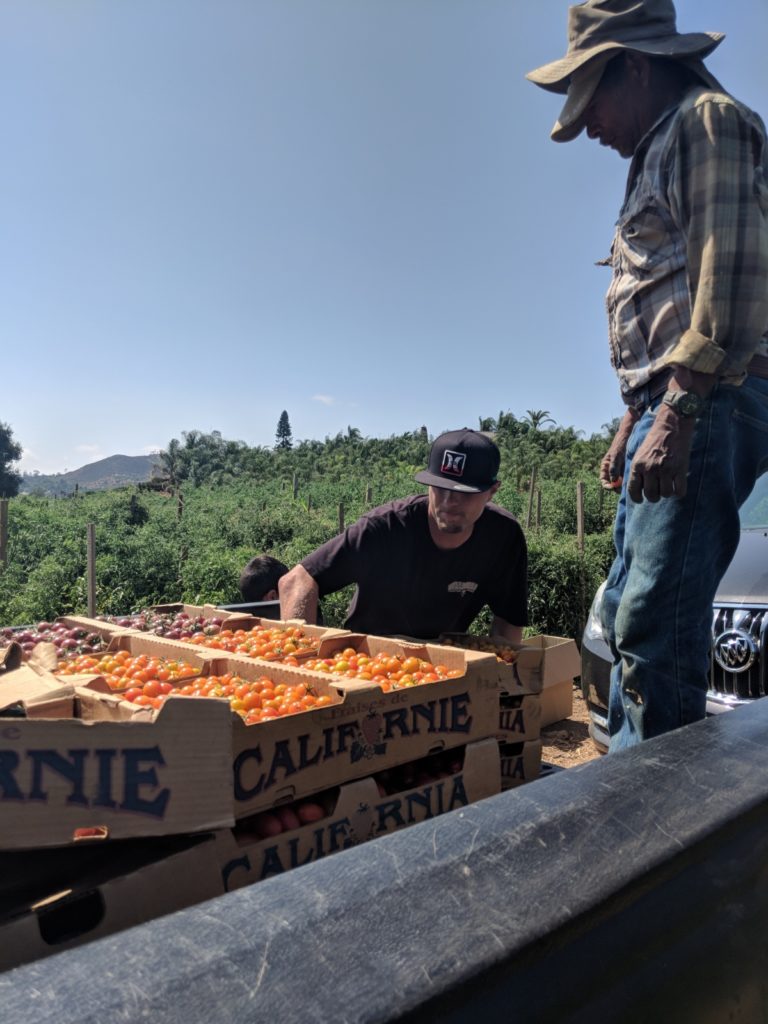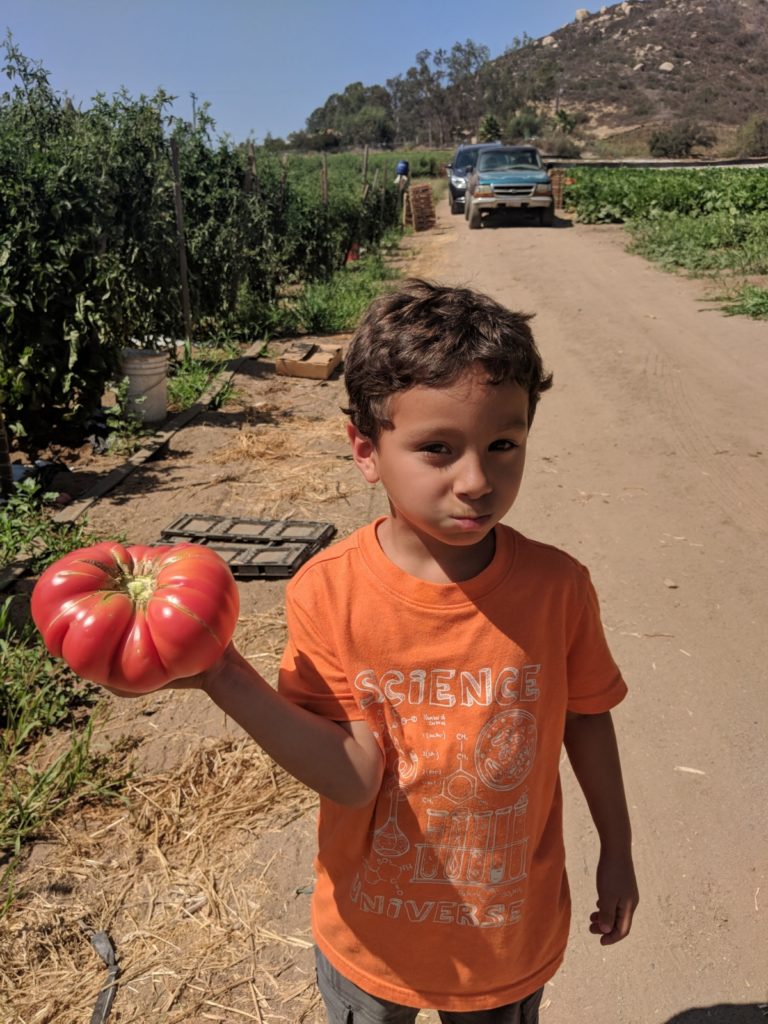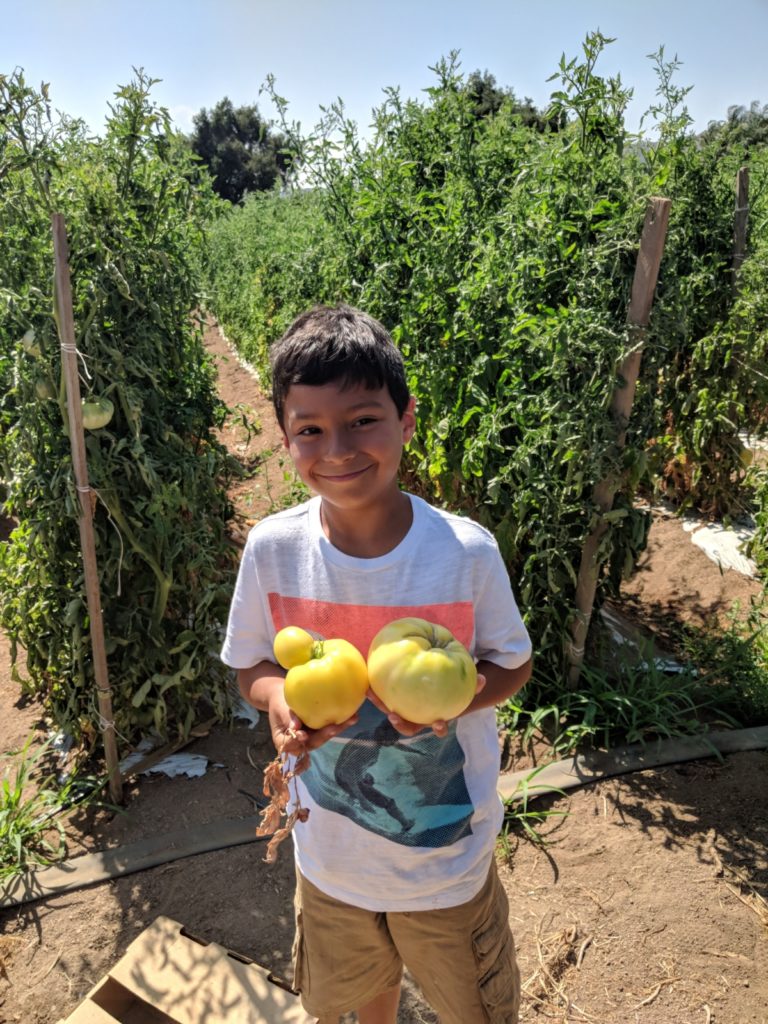Jurgen Heil immigrated to the US from Austria when he was 11 years old. His dad, Johann, is a professional baker who opened Johann’s Gluten-Free Bakery in San Diego in 1992, which has since soared in popularity.
Like many immigrant children, Jurgen helped out with the family business. One of his jobs was to sell baked goods at the local farmers market on the weekends.
At one such San Diego farmers market in 2005 a young woman named Bernice caught his eye. Like Jurgen, Bernice was there helping her family’s business, Rivas Farms (est. 1986), only she was selling fresh produce.
Bernice was also an immigrant, having moved from Guanajuato City in Mexico to the US years earlier. The baker’s son and the farmer’s daughter soon fell in love and got married.

Jurgen and Bernice enjoying a much-needed vacation.
Rivas Farms Expands
After the two married, Jurgen and Bernice decided to join forces to grow Rivas Farms’ operations in Vista, CA. Her family had generations of experience in farming, so Jurgen had a steep learning curve when he came aboard.
Today, Rivas Farms employs six full-time employees in the Rivas family and 10-20 non-family, seasonal workers, depending on the season. The farm operates on about 40 leased acres.
Rather than growing all one crop, Rivas Farms is highly diversified. In the winter, they primarily grow broccoli, multi-colored cauliflower, sugar snap and English peas, fava beans, and strawberries. In the summer, they grow a huge variety of heirloom tomatoes, summer squash, cucumbers, and beans.

Rivas Farms’ workers loading up farm-fresh organic produce for market.
Crop rotation helps reduce pest and disease pressure organically, and the legume crops (beans and peas) help build the soil fertility for the next crop since they’re “nitrogen-fixers.”
Jurgen also admits to having a few perennial crops like avocados, guavas, oranges, and persimmons on the farm, although that produce never seem to make it to market. He laughs and says that all of those crops seem to end up on the dinner tables of various families and workers at the farm.
Going USDA Certified Organic
A lot of small farms face a choice as to whether or not to become USDA certified organic, a process that requires detailed documentation and annual inspections by third party certifying agencies.
Understandably, retail buyers and farmers market shoppers want to see the certified organic label to verify a farmer’s promise that they’re “doing things right.”
As Jurgen tells it, when he took over the business in 2012, Rivas Farms wasn’t using pesticides and they were only using organic fertilizers, rather than synthetic fertilizers. They basically already were an organic farm, they just didn’t have the certifications to prove it to customers.
“We might as well be certified to get paid for growing organic food,” Jurgen reflects on his thought process at the time. Thus, Rivas Farms officially became USDA certified organic.
“The hardest part is keeping up with the paperwork and documentation, since I’m like most farmers and just want to spend my time out in the field.” The farm is now using various apps and software to help make the necessary record keeping easier.
Another often unnoticed benefit of being a certified organic farm that Jurgen notes: his workers love it. “They’re more passionate about organic, more passionate about coming to work. They’re anxious about being exposed to pesticides. The workers are on the front lines doing the work, and shoppers need to consider how what they eat impacts farm workers and their families too.”
The next generation
Jurgen and Bernice are proud parents to two boys: Fabian (four years old) and Jayden (eight years old).
Are the kids going to be the next generation to run Rivas Farms? Jurgen seems to think it’s more likely the younger one will become a soccer star and the older one will become a scientist. He ultimately wants them to do what they want to do, and not feel pressured to take over the operation.

Fabian showing off his giant heirloom tomato.
“They do love coming out to the farm to eat the food, ride horses, and pet Peggy,” Jurgen notes.
In case you’re wondering, “Peggy” is the stray dog that showed up in the fields eight years ago and never left. Peggy might just be the hardest worker at Rivas Farms, and she’s certainly the most underpaid.
As it turns out, coyotes are a huge problem for area farmers. Increasingly omnivorous, they eat strawberries, tomatoes, melons and pretty much every other crop farmers in the area grow, plus they chew through irrigation lines in order to get a drink of water. This can cost farmers quite a bit of money and untold headaches…. at least farmers who don’t have a Peggy.
In exchange for a bowl of kibble, fresh water, and regular head rubs, Peggy is constantly on the prowl chasing coyotes out of the fields. She’s also adept at keeping other crop-eating mammals like rabbits and squirrels out of the fields as well.
Asked what they’ll do for “coyote control” on the sad day in the future when Peggy shuffles off this mortal coil, Jurgen’s voice lowers. “I don’t even want to think about it.”
The marketing plan: no social media, no website
If you search the web for “Rivas Farms,” you won’t find much. Notably, there’s no website. Nor is there a facebook page, twitter, or Instagram account.
This un-marketing plan is not accidental.
“It’s way too hard to do anything else well other than farming and running the business given the limited number of hours in a day. Our farm has been successful at turning out high quality organic produce and building face-to-face relationships with our customers for many years, so we’re not too worried about our online marketing presence at this point.”
Rivas has taken advantage of newfangled technologies such as email and text messages. “My four year old son has to show me how to use my phone apps,” Jurgen says, laughing.

Farm kids help with quality control and new technology at Rivas Farms.
Where to find Rivas Farms’ produce
Rivas Farms sells to a wide variety of local wholesale and retail customers: local restaurants, farmers markets in San Diego and LA County, wholesale distributors, and small mom & pop grocers like Frazier Farms grocery stores in Vista and Oceanside.
Another important customer who has helped Rivas Farms grow is Daily Harvest Express. About five years ago, Daily Harvest’s Janis and Rafael Garcia approached Jurgen and Bernice at the Leucadia Farmers Market to see if they’d want to provide produce for the company’s Farm Boxes and corporate break room boxes. Just as Jurgen and Bernice initially met and fell in love at a farmers market, love was in the air on this fateful day too.
Years later, like a good marriage, the relationship between Rivas Farm and Daily Harvest Express is built on trust, mutual respect, and admiration. And Daily Harvest Express customers throughout San Diego get to enjoy the delicious, organic produce that Jurgen and team work so hard to create.
“They’re just great people and the relationship has been extremely beneficial to our business,” Jurgen says of Daily Harvest.
The feeling is mutual. We’re grateful for Rivas Farms and the people (and stray dog) who make it all possible. We look forward to many good years ahead, bringing local organic produce to kitchens and offices throughout San Diego County.

